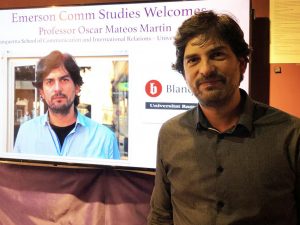Meet Oscar Mateos: Lead Researcher, Emerson-Blanquerna Center for Global Communication

By Molly Loughman
Uniting international scholars to address global challenges and humanitarian issues, the Emerson-Blanquerna Center for Global Communication attracts an array of experts, including Oscar Mateos, Blanquerna’s associate professor of Communication and International Relations.
The Barcelona native, whose expertise is in conflict analysis and peace-building as it pertains to African countries, visited with Communication Studies students this week. Mateos spoke about the global research underway at the center, which was founded to create new opportunities for research and teaching collaborations between the institutions.
“Of all the different initiatives, the most impressive one is the relationship with Emerson. I think it’s a very impressive and fruitful alliance,” said Mateos, referring to last October’s 4th Annual Emerson Blanquerna Global Summit in Washington D.C. “This is such a great opportunity for us as teachers to enrich our perspectives and to have more cooperation and collaboration with colleagues from such an interesting institution like Emerson.”
Located in the heart of Barcelona, Blanquerna University has made its way to Downtown Boston since becoming Emerson’s “Global Academic Partner” in Spring 2018 with the signing of an institutional agreement. Like Emerson, Blanquerna is working to expand its presence worldwide. Mateos, whose work has focused on humanitarian issues, explained Emerson brings a fresh and progressive perspective to global issues.
The Research
As a Lead Researcher, Mateos oversees 15 scholars under the Emerson-Blanquerna Center for Global Communication’s GLOBALCODES Research Group, which addresses globalization, conflict development, and security systems.
One of the group’s projects pertains to how international security efforts are understanding, from a narrative perspective, security in a very restrictive way. It aims to assess how different entities are constructing their different discourses and narratives from this “securitized perspective of security,” said Mateos. Another project deals with democracy and social movements around the world, particularly in Africa.
“[The research involves] some of the most interesting social unrest democratization processes that are taking place in many countries, and assessing the different challenges, features, and characteristics of this different context,” said Mateos.
The GLOBALCODES Research Group is also pursuing a peace-building project which examines how different international organizations are attempting to enforce the concept of local ownership. Local ownership addresses how those who’ve suffered the most violence are those who are leading their own social and political processes — and how international organizations are respecting local leadership, noted Mateos.
Categories